Module4 Life in the future.Unit1 Everyone will study at home.课件(共46张PPT)
文档属性
| 名称 | Module4 Life in the future.Unit1 Everyone will study at home.课件(共46张PPT) | 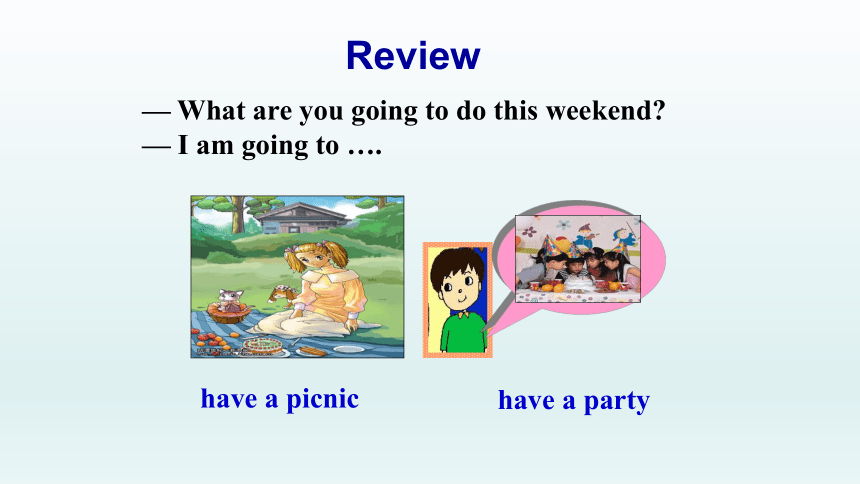 | |
| 格式 | pptx | ||
| 文件大小 | 2.7MB | ||
| 资源类型 | 教案 | ||
| 版本资源 | 外研版 | ||
| 科目 | 英语 | ||
| 更新时间 | 2022-07-06 13:16:14 | ||
图片预览

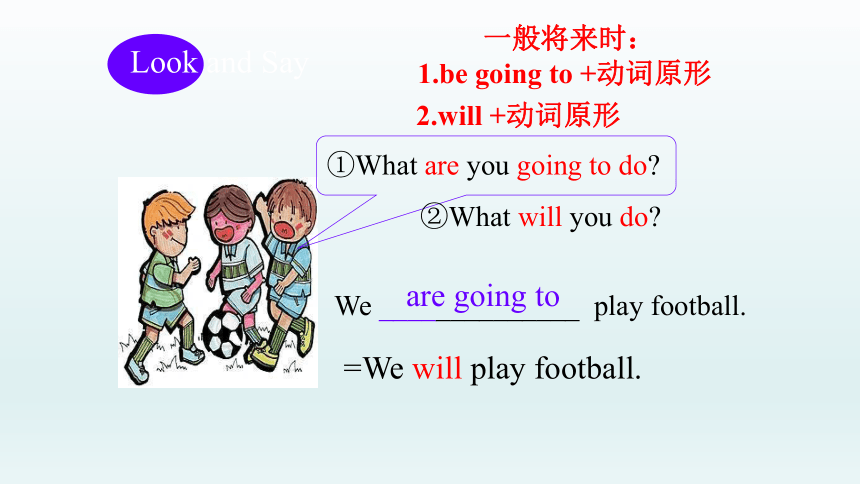
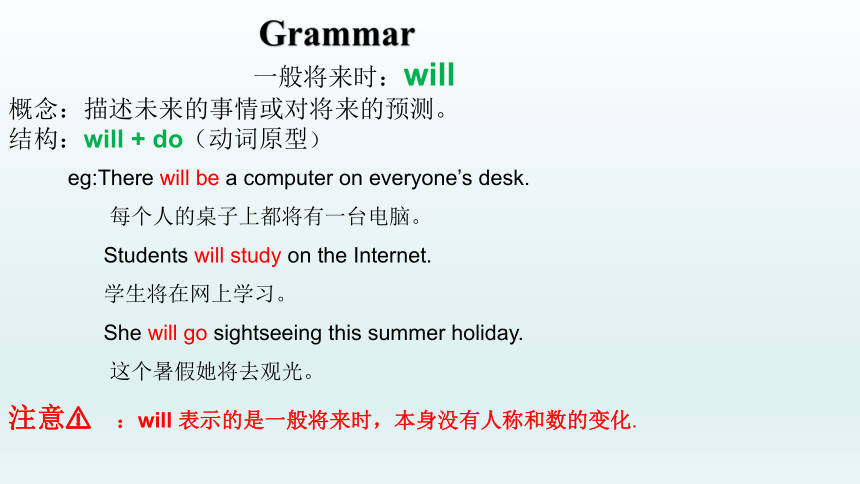
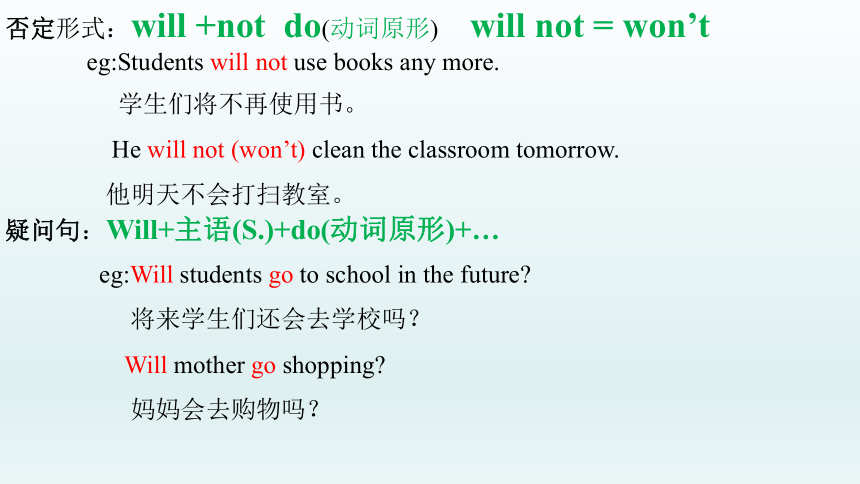
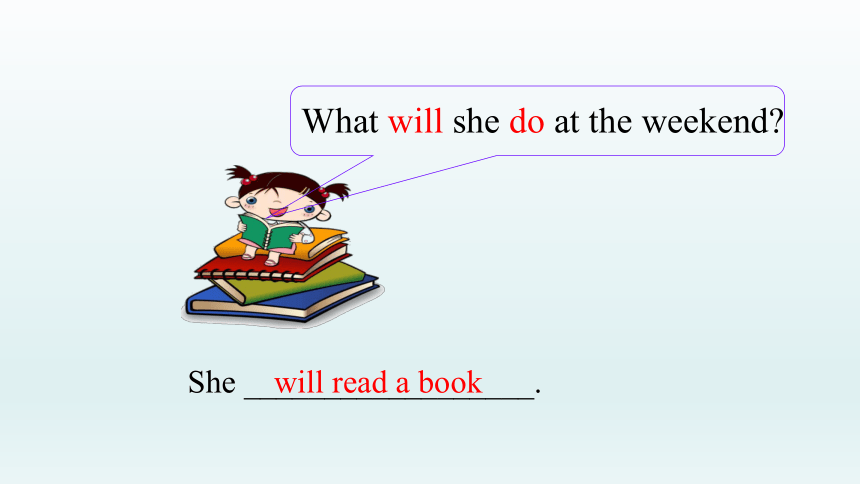
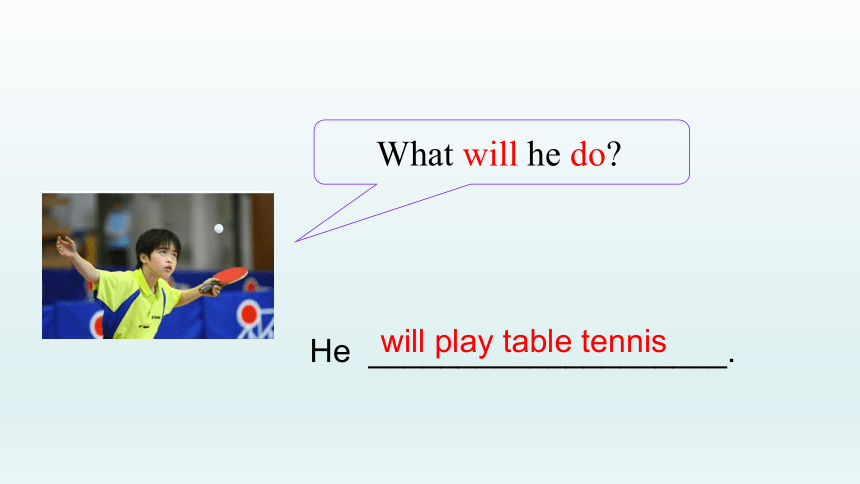
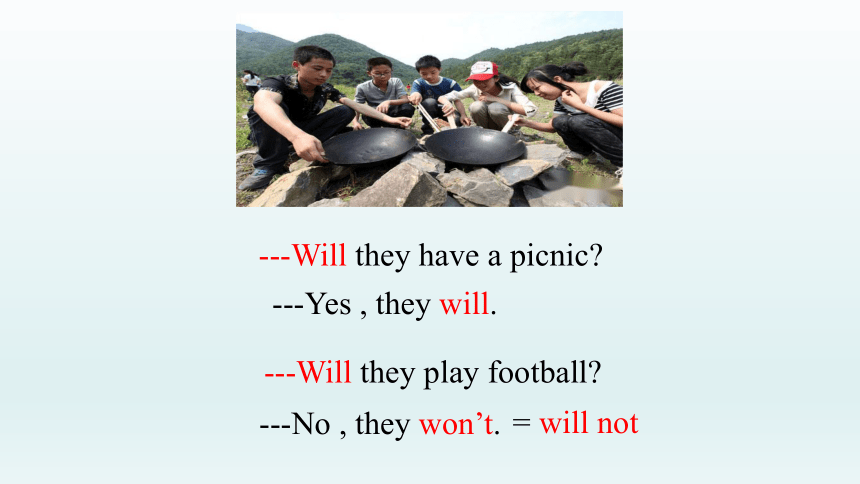
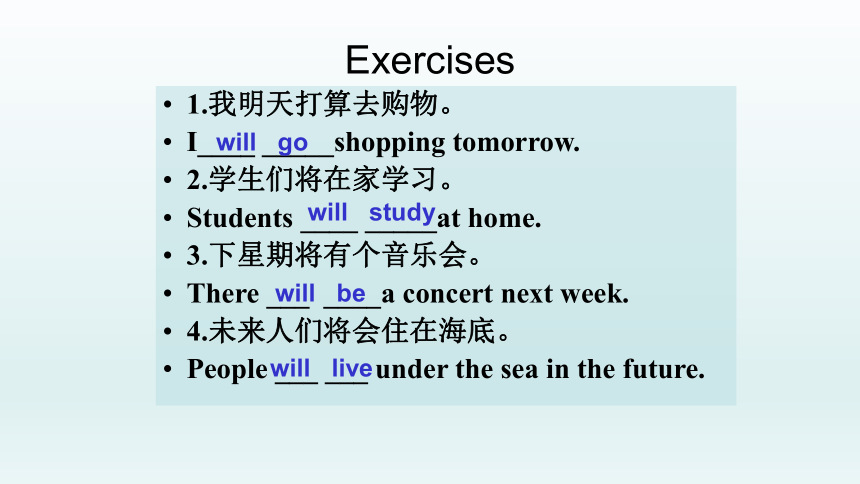
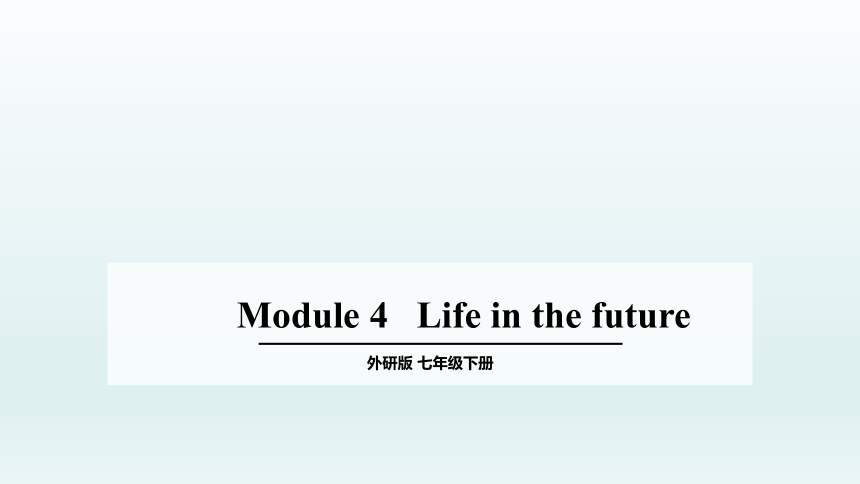
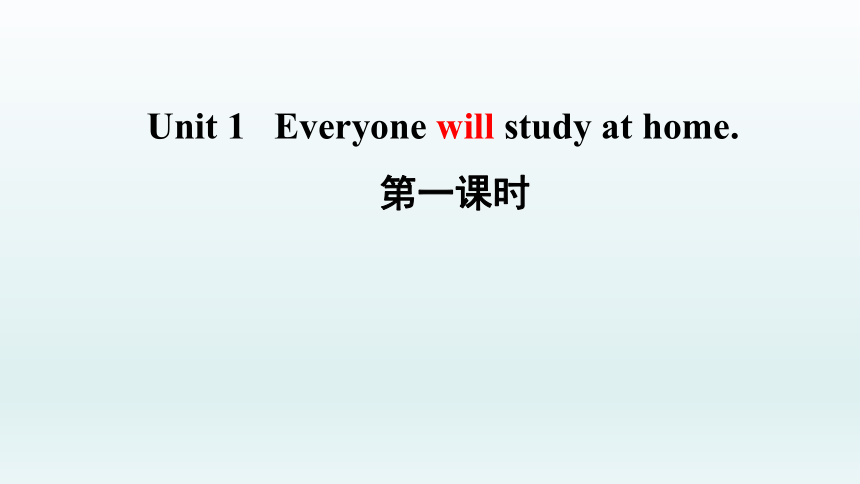
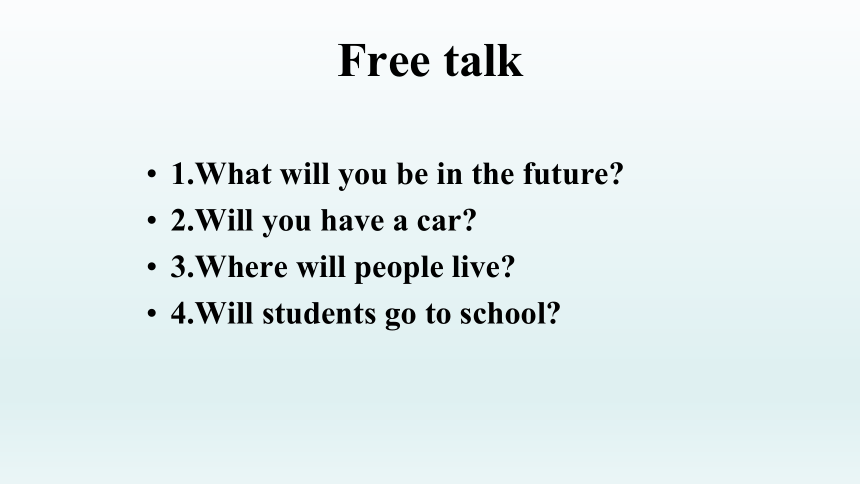

文档简介
(共46张PPT)
— What are you going to do this weekend
— I am going to ….
Review
have a picnic
have a party
We ______________ play football.
Look and Say
are going to
一般将来时:
1.be going to +动词原形
①What are you going to do
=We will play football.
2.will +动词原形
②What will you do
Grammar
一般将来时:will
概念:描述未来的事情或对将来的预测。
结构:will + do(动词原型)
eg:There will be a computer on everyone’s desk.
每个人的桌子上都将有一台电脑。
Students will study on the Internet.
学生将在网上学习。
She will go sightseeing this summer holiday.
这个暑假她将去观光。
注意 :will 表示的是一般将来时,本身没有人称和数的变化.
否定形式:will +not do(动词原形) will not = won’t
eg:Students will not use books any more.
学生们将不再使用书。
He will not (won’t) clean the classroom tomorrow.
他明天不会打扫教室。
疑问句:Will+主语(S.)+do(动词原形)+…
eg:Will students go to school in the future
将来学生们还会去学校吗?
Will mother go shopping
妈妈会去购物吗?
She __________________.
will read a book
What will she do at the weekend
What will he do
He ____________________.
will play table tennis
---Will they have a picnic
---Yes , they will.
---Will they play football
---No , they won’t.
= will not
Exercises
1.我明天打算去购物。
I____ _____shopping tomorrow.
2.学生们将在家学习。
Students ____ _____at home.
3.下星期将有个音乐会。
There ___ ____a concert next week.
4.未来人们将会住在海底。
People ___ ___ under the sea in the future.
will go
will study
will be
will live
Module 4 Life in the future
外研版 七年级下册
Unit 1 Everyone will study at home.
第一课时
Free talk
1.What will you be in the future
2.Will you have a car
3.Where will people live
4.Will students go to school
Words and expressions
/t :k /
/'ru:l /
/'k rI/
/t eInd /
/'evrIθI /
/'fju:t /
粉笔 n.
chalk
直尺 n.
ruler
拿;带 v.
change
改变;变化 v.&n.
future
每样事物
carry
将来;未来 n.
everything
in the future
将来
/laIf /
/ni:d/
/wIl/
/'meIbi/
/ɑ:sk/
/'kwest n/
/baI/
生活;生命 n.
life
需要 n.&v.aux.
need
将;将要 v.aux.
maybe
也许 adv.
question
询问;问 v.
will
问题 n.
ask
用;靠;乘
by
水平 n.
level
能够…的 adj.
able
能够做…
more
更加;更 adv.
更多的 adj.
be able to
不再…
(时间)空闲的;空余的 adj.
free
/'lev l /
/'eIbl/
/m :/
/fri:/
not any more
blackboard
ruler
paper
pencil
pen
New words
dictionary
New words
computer
cell phone
calculator
chalk
blackboard chalk
computer email
eraser Internet
paper pen pencil
ruler telephone
1 Work in pairs. Look at the picture and describe it. Say what will you use to study.
carry change everything future life need will
1. Will our life be different in the future
2. Will our schools change
2 Listen and choose Lingling’s answers
to the questions.
Yes, it will./ No, it won’t.
Yes, they will./ No, they won’t.
3. Will everything be different
4. Will students need computers at school
5. Will they carry lots of books to school
Yes, it will./ No, it won’t.
Yes, they will./ No, they won’t.
Yes, they will./ No, they won’t.
6.What will they carry
7. What else will change in the future
8. What will the computer be like
Ideas Daming Betty Tony
Everyone will study at home in the future.
Students will talk to their teacher on the Internet.
School is good fun and you can make friends there.
No one will use pens, paper or erasers.
√
√
√
√
Now check(√) the students’ ideas about the future.
1. Will there be schools in the future
2. Where will everyone study in the future
3. How will the students ask their questions to the teachers
4. Will teachers use chalks in class
No, there won’t.
Everyone will study at home in the future.
They can ask their teachers questions by Internet, telephone or email.
No, they won’t.
Read and answer the questions.
We will study at home and only go to school
for sports and games.
Will, this is good, but I’ll miss my teacher
and friends.
Work in pairs. Talk about what your school will be like in ten years.
able any more free level
maybe need question telephone
Betty: We’ll always (1)_______ teachers because computers will never be (2)_______to check the students’(3)________ and answer their (4)________ by (5)__________ or Internet. Will students need to go to school (6)__________ Yes,(7) ________ they will, because school is good fun, but everyone will have lots of (8)_______ time.
need
able
level
questions
telephone
any more
maybe
free
Complete the passage.
Language points
1. chalk
chalk作名词,意为“粉笔”,是不可数名词。
一支粉笔:
a piece of chalk
*Would you get some chalk
你愿意去取一些粉笔吗?
1. carry 搬运,带来
【辨析】bring、take、carry
(1) bring意为“带来”,指把某物从别的地方带到说话时的这个地方来。如:
Eg. Remember to bring your book tomorrow.
记住明天把你的书带来。
(2) take意为“带走”,把某物带到别的地方去。
Eg. It’s going to rain. You’d better take an umbrella with you.
即将要下雨了。你最好带上一把雨伞。
(3) carry①一般指用手或身体搬运,不强调动作方向,
②此外还多用于汽车、火车等交通工具,意为“运载,承 载”的意思。如:
Eg.He always carries a pocket dictionary with him.
他总是随身携带一本袖珍字典。
Eg. The bus carried me to the park yesterday.
昨天公共汽车把我拉到了公园。
4.Will schools be different in the future “将来”,表示未来。
我不知道将来会发生什么事。
I don’t know what will happen in the future.
in twenty years’ time 20年后
in twenty years’ time = in twenty years,此时后面不加time。“in+一段时间”表示“一段时间之后”,常用在一般将来时中,用how soon(多久)来提问。
考点一
eg:1.我爸爸一周后将去北京。
My father will go to Beijing in a week/ in a week’s time.
2.----你多久之后回来? ----一个月之后。
__________ will you come/be back ---- ___________.
How soon
In a month
eg:(山西中考)I will finish the poster for the party ____________.
两天后我将完成聚会用的海报。
in two days
8. In twenty year’s time, maybe there won’t be any schools.
maybe: adv.副词,“也许,可能”,在句中做状语,常位于句首。
Eg: 她可能在家里。
Maybe she is at home.
他今下午可能会回来。
Maybe he will come back this afternoon.
They can ask their teachers questions by Internet, telephone or email.
ask/ɑ sk/v . 询问;问
考向一【易错点】
ask sb. sth.询问某人某事。与answer“回答”对应。
ask for sth. 请求,恳求(给予)某物。
eg:He asked me a question,but I didn’t answer.
他问了我一个问题,但我没有回答。
Many students ask for advice about learning English.
许多学生寻求关于学习英语的建议。
You can ask the police for help.
你可以向警察寻求帮助。
考向二【重点】
ask后接不定式结构,ask sb. to do sth.表示“要求某人做某事”;ask sb. not to do sth. 表示“要求某人不要做某事”。
eg:Our teacher asks us to listen carefully in class.
我们的老师要求我们在课堂上认真听讲。
The teacher asks me not to be late for school again.
老师叫我上学不要再迟到了。
2. They can ask their teachers questions by Internet, telephone or email.
他们可以通过互联网、电话或电子邮件向老师提问。
by: 表示方式,意思是“用……,靠……,通过……”。
by+ n.(可名单)/pron./v.ing 做某事的“方法,手段,方式”等。
Eg:We can talk to each other by QQ.
我们可以彼此通过QQ聊天。
I learn English by reading.
我通过朗读学习英语。
You can improve(提高) your English ___ listening to English songs.
A. by B. with C. for D. in
①with: 和...在一起; 用(工具,材料)等
eg: 我和他一起打篮球。
I play basketball with him.
我用刀把苹果切开。
I cut an apple with a knife.
②for: 为了...(表目的)
eg这学期新的俱乐部在公告板上。
The new clubs for this term are on the board.
你能为我拍张照吗?
Can you take a picture for me?
③in: 在...里; 用(某种语言)
eg:你能和她用英语交谈吗?
Can you talk to/with her in English?
there won’t be = there will not be
这是there be结构的一般将来时的否定形式, 肯定结构
为: there will be.当然there be结构的将来时结构也可
以用there is going to be 或there are going to be. 如:
1) There will be a football match on TV tomorrow.
= There is going to be a football match on TV tomorrow.
2) There will be some schools in the future.
= There are going to be some schools in the future.
3. Well , I’m not sure.
be sure 确信, 一定
be sure 后可跟不定式或从句, 句意也不相同。
如: 1) I am sure to go to Beijing tomorrow.
= I am sure that I will go to Beijing tomorrow.
我明天一定会去北京。
2) He is sure to visit the Great Wall next week.
= He is sure that he will visit the Great Wall
next week. 他下周一定会去参观长城。
3) I am sure he will fly to America in a few days.
我相信几天后他将乘飞机去美国。
4. Computer won’t be able to do that.
be able to do ≈can + do 能/会做...
be able to 指具有做某件事的能力 通过be动词的变化或前面加助动词可构成多种时态
can 泛指一般的能力 只能用于一般现在时(can)和一般过去时(could)两种时态
eg:她会弹钢琴。
She can play the piano.
将来人们能够飞赴月球。
People will be able to fly to the moon in the future.
not…any more 不再
Eg:He is not a student any more. 他不再是一个学生了。
5.Students will not use pens and paper, or erasers any more.
Eg:你不能再喝了。
You can’t drink any more.
我再也不那样做了。
I won’t do that any more.= I will no more do that.
= no more侧重程度和数量。
=He is no more a student.
(2) be able to 强调一种结果,而can只强调一种可能。如:Luckily, he was able to escape from the big fire in the end.
幸运的是,他终于逃出了大火。
If he got here a few hours earlier, I could save him.
要是他早几小时来,我还能救他。
(3) be able to 可以有各种时态;而can只有一般现在和一般过去两种时态。如:
I could help you last night, but you didn’t come. 昨天晚上我能帮你,而你又没来。
Can you see it there 你能看见它在那儿吗?
He is / was / will be able to help you. 他能帮你的忙.
(4) can可用于表示可能性,推测,允许等情况,而be able to通常不这样用。
5. not…any more 不再
= no more侧重程度和数量,比如:
You can drink no more.
= You can't drink any more. 你不能再喝了
not any longer
= no longer重时间,比如:
He no longer lives here.
= He doesn't live here any longer.
Homework
1.Remember the new words.
2.write a short passage and draw a picture of your dream school.
— What are you going to do this weekend
— I am going to ….
Review
have a picnic
have a party
We ______________ play football.
Look and Say
are going to
一般将来时:
1.be going to +动词原形
①What are you going to do
=We will play football.
2.will +动词原形
②What will you do
Grammar
一般将来时:will
概念:描述未来的事情或对将来的预测。
结构:will + do(动词原型)
eg:There will be a computer on everyone’s desk.
每个人的桌子上都将有一台电脑。
Students will study on the Internet.
学生将在网上学习。
She will go sightseeing this summer holiday.
这个暑假她将去观光。
注意 :will 表示的是一般将来时,本身没有人称和数的变化.
否定形式:will +not do(动词原形) will not = won’t
eg:Students will not use books any more.
学生们将不再使用书。
He will not (won’t) clean the classroom tomorrow.
他明天不会打扫教室。
疑问句:Will+主语(S.)+do(动词原形)+…
eg:Will students go to school in the future
将来学生们还会去学校吗?
Will mother go shopping
妈妈会去购物吗?
She __________________.
will read a book
What will she do at the weekend
What will he do
He ____________________.
will play table tennis
---Will they have a picnic
---Yes , they will.
---Will they play football
---No , they won’t.
= will not
Exercises
1.我明天打算去购物。
I____ _____shopping tomorrow.
2.学生们将在家学习。
Students ____ _____at home.
3.下星期将有个音乐会。
There ___ ____a concert next week.
4.未来人们将会住在海底。
People ___ ___ under the sea in the future.
will go
will study
will be
will live
Module 4 Life in the future
外研版 七年级下册
Unit 1 Everyone will study at home.
第一课时
Free talk
1.What will you be in the future
2.Will you have a car
3.Where will people live
4.Will students go to school
Words and expressions
/t :k /
/'ru:l /
/'k rI/
/t eInd /
/'evrIθI /
/'fju:t /
粉笔 n.
chalk
直尺 n.
ruler
拿;带 v.
change
改变;变化 v.&n.
future
每样事物
carry
将来;未来 n.
everything
in the future
将来
/laIf /
/ni:d/
/wIl/
/'meIbi/
/ɑ:sk/
/'kwest n/
/baI/
生活;生命 n.
life
需要 n.&v.aux.
need
将;将要 v.aux.
maybe
也许 adv.
question
询问;问 v.
will
问题 n.
ask
用;靠;乘
by
水平 n.
level
能够…的 adj.
able
能够做…
more
更加;更 adv.
更多的 adj.
be able to
不再…
(时间)空闲的;空余的 adj.
free
/'lev l /
/'eIbl/
/m :/
/fri:/
not any more
blackboard
ruler
paper
pencil
pen
New words
dictionary
New words
computer
cell phone
calculator
chalk
blackboard chalk
computer email
eraser Internet
paper pen pencil
ruler telephone
1 Work in pairs. Look at the picture and describe it. Say what will you use to study.
carry change everything future life need will
1. Will our life be different in the future
2. Will our schools change
2 Listen and choose Lingling’s answers
to the questions.
Yes, it will./ No, it won’t.
Yes, they will./ No, they won’t.
3. Will everything be different
4. Will students need computers at school
5. Will they carry lots of books to school
Yes, it will./ No, it won’t.
Yes, they will./ No, they won’t.
Yes, they will./ No, they won’t.
6.What will they carry
7. What else will change in the future
8. What will the computer be like
Ideas Daming Betty Tony
Everyone will study at home in the future.
Students will talk to their teacher on the Internet.
School is good fun and you can make friends there.
No one will use pens, paper or erasers.
√
√
√
√
Now check(√) the students’ ideas about the future.
1. Will there be schools in the future
2. Where will everyone study in the future
3. How will the students ask their questions to the teachers
4. Will teachers use chalks in class
No, there won’t.
Everyone will study at home in the future.
They can ask their teachers questions by Internet, telephone or email.
No, they won’t.
Read and answer the questions.
We will study at home and only go to school
for sports and games.
Will, this is good, but I’ll miss my teacher
and friends.
Work in pairs. Talk about what your school will be like in ten years.
able any more free level
maybe need question telephone
Betty: We’ll always (1)_______ teachers because computers will never be (2)_______to check the students’(3)________ and answer their (4)________ by (5)__________ or Internet. Will students need to go to school (6)__________ Yes,(7) ________ they will, because school is good fun, but everyone will have lots of (8)_______ time.
need
able
level
questions
telephone
any more
maybe
free
Complete the passage.
Language points
1. chalk
chalk作名词,意为“粉笔”,是不可数名词。
一支粉笔:
a piece of chalk
*Would you get some chalk
你愿意去取一些粉笔吗?
1. carry 搬运,带来
【辨析】bring、take、carry
(1) bring意为“带来”,指把某物从别的地方带到说话时的这个地方来。如:
Eg. Remember to bring your book tomorrow.
记住明天把你的书带来。
(2) take意为“带走”,把某物带到别的地方去。
Eg. It’s going to rain. You’d better take an umbrella with you.
即将要下雨了。你最好带上一把雨伞。
(3) carry①一般指用手或身体搬运,不强调动作方向,
②此外还多用于汽车、火车等交通工具,意为“运载,承 载”的意思。如:
Eg.He always carries a pocket dictionary with him.
他总是随身携带一本袖珍字典。
Eg. The bus carried me to the park yesterday.
昨天公共汽车把我拉到了公园。
4.Will schools be different in the future “将来”,表示未来。
我不知道将来会发生什么事。
I don’t know what will happen in the future.
in twenty years’ time 20年后
in twenty years’ time = in twenty years,此时后面不加time。“in+一段时间”表示“一段时间之后”,常用在一般将来时中,用how soon(多久)来提问。
考点一
eg:1.我爸爸一周后将去北京。
My father will go to Beijing in a week/ in a week’s time.
2.----你多久之后回来? ----一个月之后。
__________ will you come/be back ---- ___________.
How soon
In a month
eg:(山西中考)I will finish the poster for the party ____________.
两天后我将完成聚会用的海报。
in two days
8. In twenty year’s time, maybe there won’t be any schools.
maybe: adv.副词,“也许,可能”,在句中做状语,常位于句首。
Eg: 她可能在家里。
Maybe she is at home.
他今下午可能会回来。
Maybe he will come back this afternoon.
They can ask their teachers questions by Internet, telephone or email.
ask/ɑ sk/v . 询问;问
考向一【易错点】
ask sb. sth.询问某人某事。与answer“回答”对应。
ask for sth. 请求,恳求(给予)某物。
eg:He asked me a question,but I didn’t answer.
他问了我一个问题,但我没有回答。
Many students ask for advice about learning English.
许多学生寻求关于学习英语的建议。
You can ask the police for help.
你可以向警察寻求帮助。
考向二【重点】
ask后接不定式结构,ask sb. to do sth.表示“要求某人做某事”;ask sb. not to do sth. 表示“要求某人不要做某事”。
eg:Our teacher asks us to listen carefully in class.
我们的老师要求我们在课堂上认真听讲。
The teacher asks me not to be late for school again.
老师叫我上学不要再迟到了。
2. They can ask their teachers questions by Internet, telephone or email.
他们可以通过互联网、电话或电子邮件向老师提问。
by: 表示方式,意思是“用……,靠……,通过……”。
by+ n.(可名单)/pron./v.ing 做某事的“方法,手段,方式”等。
Eg:We can talk to each other by QQ.
我们可以彼此通过QQ聊天。
I learn English by reading.
我通过朗读学习英语。
You can improve(提高) your English ___ listening to English songs.
A. by B. with C. for D. in
①with: 和...在一起; 用(工具,材料)等
eg: 我和他一起打篮球。
I play basketball with him.
我用刀把苹果切开。
I cut an apple with a knife.
②for: 为了...(表目的)
eg这学期新的俱乐部在公告板上。
The new clubs for this term are on the board.
你能为我拍张照吗?
Can you take a picture for me?
③in: 在...里; 用(某种语言)
eg:你能和她用英语交谈吗?
Can you talk to/with her in English?
there won’t be = there will not be
这是there be结构的一般将来时的否定形式, 肯定结构
为: there will be.当然there be结构的将来时结构也可
以用there is going to be 或there are going to be. 如:
1) There will be a football match on TV tomorrow.
= There is going to be a football match on TV tomorrow.
2) There will be some schools in the future.
= There are going to be some schools in the future.
3. Well , I’m not sure.
be sure 确信, 一定
be sure 后可跟不定式或从句, 句意也不相同。
如: 1) I am sure to go to Beijing tomorrow.
= I am sure that I will go to Beijing tomorrow.
我明天一定会去北京。
2) He is sure to visit the Great Wall next week.
= He is sure that he will visit the Great Wall
next week. 他下周一定会去参观长城。
3) I am sure he will fly to America in a few days.
我相信几天后他将乘飞机去美国。
4. Computer won’t be able to do that.
be able to do ≈can + do 能/会做...
be able to 指具有做某件事的能力 通过be动词的变化或前面加助动词可构成多种时态
can 泛指一般的能力 只能用于一般现在时(can)和一般过去时(could)两种时态
eg:她会弹钢琴。
She can play the piano.
将来人们能够飞赴月球。
People will be able to fly to the moon in the future.
not…any more 不再
Eg:He is not a student any more. 他不再是一个学生了。
5.Students will not use pens and paper, or erasers any more.
Eg:你不能再喝了。
You can’t drink any more.
我再也不那样做了。
I won’t do that any more.= I will no more do that.
= no more侧重程度和数量。
=He is no more a student.
(2) be able to 强调一种结果,而can只强调一种可能。如:Luckily, he was able to escape from the big fire in the end.
幸运的是,他终于逃出了大火。
If he got here a few hours earlier, I could save him.
要是他早几小时来,我还能救他。
(3) be able to 可以有各种时态;而can只有一般现在和一般过去两种时态。如:
I could help you last night, but you didn’t come. 昨天晚上我能帮你,而你又没来。
Can you see it there 你能看见它在那儿吗?
He is / was / will be able to help you. 他能帮你的忙.
(4) can可用于表示可能性,推测,允许等情况,而be able to通常不这样用。
5. not…any more 不再
= no more侧重程度和数量,比如:
You can drink no more.
= You can't drink any more. 你不能再喝了
not any longer
= no longer重时间,比如:
He no longer lives here.
= He doesn't live here any longer.
Homework
1.Remember the new words.
2.write a short passage and draw a picture of your dream school.
同课章节目录
- Module 1 Lost and found
- Unit 1 Whose bag is this?
- Unit 2 Are they yours?
- Unit 3 Language in use
- Module 2 What can you do ?
- Unit 1 I can play the piano
- Unit 2 I can run really fast
- Unit 3 Language in use
- Module 3 Making plans
- Unit 1 What are you going to do at the weekends?
- Unit 2 We're going to cheer the players.
- Unit 3 Language in use
- Module 4 Life in the future
- Unit 1 Everyone will study at home
- Unit 2 Every family will have a small plane.
- Unit 3 Language in use
- Module 5 Shopping
- Unit 1 What can I do for you?
- Unit 2 You can buy everything on the Internet
- Unit 3 Language in use
- Module 6 Around town
- Unit 1 Could you tell me how to get to the Nationa
- Unit 2 The London Eye is on your right.
- Unit 3 Language in use
- Revision module A
- Module 7 My past life
- Unit 1 I was born in a small village.
- Unit 2 I was born in Quincy.
- Unit 3 Language in use
- Module 8 Story time
- Unit 1 Once upon a time….
- Unit 2 Goldilocks hurried out of the house.
- Unit 3 Language in use
- Module 9 Life history
- Unit 1 He left school and began work at the age of
- Unit 2 He decided to be an actor.
- Unit 3 Language in use
- Module 10 A holiday journey
- Unit 1 What did you do?
- Unit 2 This morning we took a walk.
- Unit 3 Language in use
- Module 11 Body language
- Unit 1 They touch noses!
- Unit 2 Here are some ways to welcome them.
- Unit 3 Language in use
- Module 12 Western music
- Unit 1 It's so beautiful!
- Unit 2 Vienna is the centre of European classical
- Unit 3 Language in use
- Revision module B
